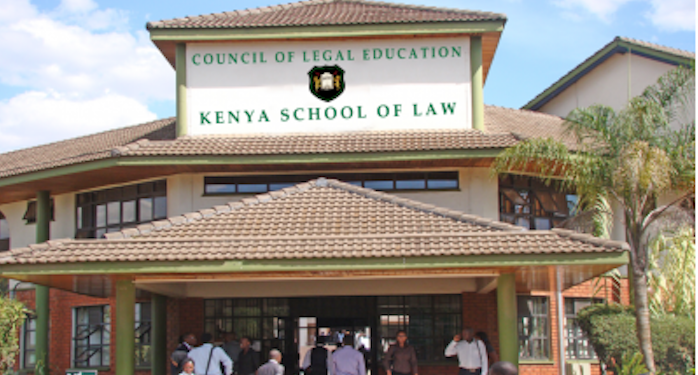The integrity of legal education in Kenya hangs in the balance with performance falling drastically at the Kenya School of Law, the only bar school in Kenya, yet the problem is not students’ brains!
It is understood that performance standards have steadily been falling over the past five years. The school went from a pass rate of 25% in 2012 to 9% in 2016, according to insiders, despite the fact it is ISO certified.
It’s not that law students have suddenly become dump. The Council of Legal Education, the examining body of bar examinations, has been accused of failing students deliberately to force them for re-sits that earn the college and lecturers millions of shillings.
A re-sit costs Ksh10,000 and a remark sets a student back Ksh15,000 per paper. With nine papers to be examined, having students fail and retake exams can be a lucrative venture. For instance, the number of students who sat the bar exam in November/December 2016 were 1,927.
The percentage of students that passed all the nine units was only 9%. That means that only 173 students out of 1,927 passed. The other 1,754 were forced to pay for either a re-sit or a remark.
“Say they all opt to pay for a re-sit, that means the Council of Legal Education would have earned itself Ksh17,540,000 untaxed money,” said a source from the college who has been studying the performance trends. “If they all opt to pay for a remark, the Council of Legal Education will earn Ksh26,310,000 untaxed money.”
See Also: Government to recruit 10,000 police officers in May
After completing undergraduate degrees in law from a recognised university, students attend the Kenya School of Law to be prepared for admission to the Bar. The Kenya School of Law, established as a law vocational training school in 1963, was retooled in 1995 due to the establishment of faculties of law in East African universities, to provide the Advocates Training Program, which focused on the preparation of young lawyers for entry into the legal profession.
Students and parents believe the college is running a scheme that is frustrating students but rewarding it handsomely. It is also said the scripts students write on for the bar exam are usually not properly marked or not marked at all, explaining why remarking sees a good number of students pass.
Memoirs: Moody Awori reveals his little secrets
Even renowned lawyer PLO Lumumba touched on the issue when he addressed fresh students during their orientation early this year.
In 2005, a ministerial task force on the Development of a Policy and Legal Framework for Legal Education in Kenya expanded the mandate of the Kenya School of Law to include the following Advocates Training, Continuing Professional Legal Development, Paralegal Training, provision of Specialized Professional Legal Training in Public Service, Conducting of Projects, Consultancies and Research. The Council of Legal Education Act is the basis of legal training in Kenya.







![President William Ruto during the launch of Climate WorX in Nairobi. [Photo/PCS]](https://businesstoday.co.ke/wp-content/uploads/2024/10/President-William-Ruto-during-the-launch-of-Climate-WorX-in-Nairobi-1-e1727761613802.png)





Leave a comment